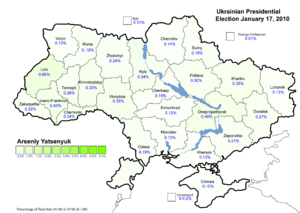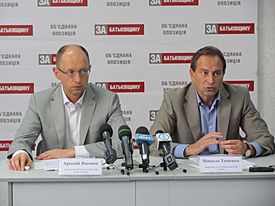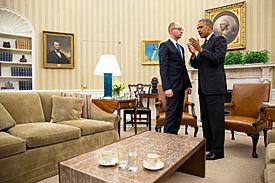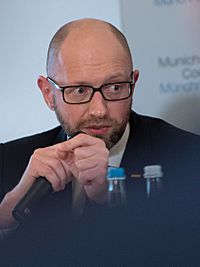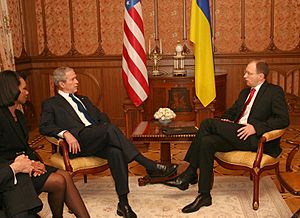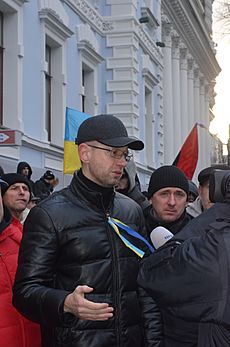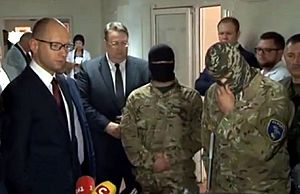Arseniy Yatsenyuk facts for kids
Quick facts for kids
Arseniy Yatsenyuk
|
|
|---|---|
|
Арсеній Яценюк
|
|
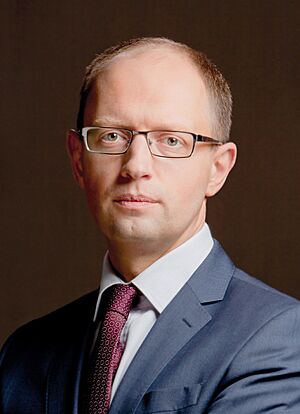
Yatsenyuk in 2011
|
|
| 15th Prime Minister of Ukraine | |
| In office 31 July 2014 – 14 April 2016 |
|
| President | Petro Poroshenko |
| Preceded by | Volodymyr Groysman (acting) |
| Succeeded by | Volodymyr Groysman |
| In office 27 February 2014 – 25 July 2014 |
|
| President | Oleksandr Turchynov (acting) Petro Poroshenko |
| Deputy | Vitaly Yarema Hennadiy Zubko |
| Preceded by | Oleksandr Turchynov (acting) |
| Succeeded by | Volodymyr Groysman (acting) |
| 8th Chairman of the Verkhovna Rada | |
| In office 4 December 2007 – 12 November 2008 |
|
| President | Viktor Yushchenko |
| Preceded by | Oleksandr Moroz |
| Succeeded by | Oleksandr Lavrynovych (acting) |
| Minister for Foreign Affairs | |
| In office 21 March 2007 – 4 December 2007 |
|
| Prime Minister | Viktor Yanukovych |
| Preceded by | Volodymyr Ohryzko (acting) |
| Succeeded by | Volodymyr Ohryzko |
| Minister for Economy | |
| In office November 2003 – February 2005 |
|
| In office 27 September 2005 – 4 August 2006 |
|
| Prime Minister | Yuriy Yekhanurov |
| Preceded by | Serhiy Teryokhin |
| Succeeded by | Volodymyr Makukha |
| First Vice-President of the National Bank of Ukraine | |
| In office September 2001 – January 2003 |
|
| Personal details | |
| Born | 22 May 1974 Chernovtsy, Soviet Union |
| Spouse |
Tereziya Victorivna Hur
(m. 2000) |
| Children | 2 |
| Alma mater | Chernivtsi University Kyiv National University of Trade and Economics |
| Signature | |
| *Volodymyr Groysman served as Acting Prime Minister from 25 July 2014 – 31 July 2014. | |
Arseniy Petrovych Yatsenyuk (born on May 22, 1974) is a Ukrainian politician. He served as the Prime Minister of Ukraine twice. His first term was from February 2014 to November 2014. His second term was from November 2014 to April 2016. He was also Ukraine's youngest Foreign Affairs Minister ever.
Before becoming Prime Minister, Yatsenyuk held several important government jobs. He was the Minister of Economy from 2005 to 2006. Then, he became the Foreign Minister of Ukraine in 2007. From 2007 to 2008, he was the Chairman of the Verkhovna Rada, which is like the speaker of Ukraine's parliament. He became Prime Minister after a big change in Ukraine's government in 2014. In 2014, he also started a new political party called People's Front.
Contents
Early Life and Education
Arseniy Yatsenyuk was born on May 22, 1974, in Chernivtsi, Ukraine. At that time, Ukraine was part of the Soviet Union. His father, Petro Ivanovich Yatsenyuk, was a history professor at Chernivtsi National University. His mother, Maria Grigoriievna Yatsenyuk, taught French. Arseniy Yatsenyuk speaks Ukrainian, Russian, and English. He also knows some Romanian.
School and University
Yatsenyuk started studying at Chernivtsi University in 1992. While there, he even started his own student law firm. He finished university in 1996. Later, he studied at the Chernivtsi Trade-Economics Institute. He has a law degree and a master's degree in accounting. He also earned a Ph.D. in economics.
Early Career in Law and Banking
From 1992 to 1997, Yatsenyuk was the president of a law firm called Yurek Ltd. in Chernivtsi. After that, from 1998 to 2001, he worked at the Aval bank in Kyiv. He also served as the first vice-president of the National Bank of Ukraine from 2003 to 2005. After his boss left, Arseniy Yatsenyuk was put in charge of the National Bank for a short time.
Political Journey
Yatsenyuk's political career began in Crimea. From 2001 to 2003, he served as the Minister of Economy for the Autonomous Republic of Crimea. Later, in 2005, he became the vice-governor of the Odesa Oblast region.
Minister of Economy (2005–2006)
From September 2005 to August 2006, Yatsenyuk was Ukraine's Minister of Economy. In this role, he led important discussions about Ukraine joining the World Trade Organization (WTO). He signed an agreement with the U.S. that helped Ukraine become a full member of the WTO in 2008.
Foreign Minister of Ukraine (2007)
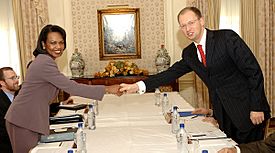
In March 2007, Ukraine's President, Viktor Yushchenko, suggested Yatsenyuk for the job of Foreign Minister. The Ukrainian parliament, called the Verkhovna Rada, approved him. As Foreign Minister, he worked to improve Ukraine's standing in the world. In July 2007, he started the Open Ukraine Foundation. This foundation aims to help Ukraine's reputation globally.
Chairman of the Verkhovna Rada (2007–2008)
In the elections held in September 2007, Yatsenyuk was elected to parliament. In December 2007, he was chosen to be the Chairman of the Parliament. This means he was in charge of leading the meetings and work of the Verkhovna Rada.
In early 2008, Yatsenyuk, along with other leaders, wrote a letter to NATO. They asked for Ukraine to be considered for joining the Alliance. He resigned from his position as Chairman in November 2008. After leaving this role, Yatsenyuk said he would create a new political group to bring change to the country.
Presidential Campaign (2010)
In April 2009, Yatsenyuk announced he would run for President of Ukraine in the 2010 election. He focused on his appearances on television during his campaign. After the election, he did not win. He then called for new parliamentary elections. In April 2010, he officially became the leader of his political party, Front for Change.
Parliament Faction Leader
For the October 2012 parliamentary election, Yatsenyuk's party joined forces with other parties under the "Fatherland" party. Because the leader of "Fatherland," Yulia Tymoshenko, was not able to lead, Yatsenyuk headed this combined election list. Their group won many seats in parliament. In December 2012, Yatsenyuk was chosen to lead the "Fatherland" group in parliament. In 2013, his Front for Change party officially joined "Fatherland."
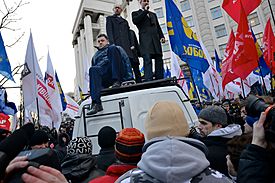
In January 2014, the President of Ukraine, Viktor Yanukovych, offered Yatsenyuk the job of Prime Minister. However, Yatsenyuk turned down the offer because his demands were not met. He believed that the people of Ukraine should decide the country's future.
Prime Minister of Ukraine
First Term (February–August 2014)
Yatsenyuk became the new Prime Minister of Ukraine on February 27, 2014, after a major political change. After he became Prime Minister, his government started to move away from Russia. He described his government's work as a "kamikaze" mission, meaning it was very difficult and risky.
On March 21, 2014, Ukraine signed an important agreement with the European Union. This agreement aimed to bring Ukraine closer to Europe.
On July 24, 2014, Yatsenyuk announced he was resigning as Prime Minister. This happened after the group of parties supporting his government in parliament broke apart. They could not agree on important laws, like increasing money for the military. He said that politicians were putting their own interests before the country's needs. However, parliament did not officially accept his resignation at that time.
On July 25, 2014, Volodymyr Hroisman was appointed as acting prime minister. But on July 31, 2014, the parliament voted against accepting Yatsenyuk's resignation. In September 2014, Yatsenyuk started his new party, People's Front. This party won many seats in the parliamentary election that year.
Second Term (August 2014 – April 2016)
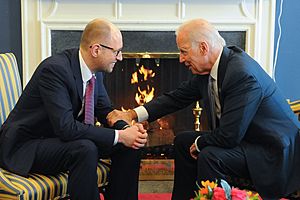
Yatsenyuk was confirmed as Prime Minister again in August 2014 with a large number of votes from the new parliament. In July 2015, he announced a successful trade agreement between Canada and Ukraine with Canadian Prime Minister Steven Harper.
In February 2016, Yatsenyuk's time as Prime Minister began to end. The economy minister resigned, saying the government was not serious about fighting problems. On February 16, 2016, President Petro Poroshenko asked Yatsenyuk to resign. The parliament also said they were not happy with the government's work but did not vote to remove him. However, some parties left the group supporting Yatsenyuk's government, meaning it no longer had enough support.
On April 10, 2016, Yatsenyuk announced he would resign as prime minister. On April 14, 2016, parliament accepted his resignation. Volodymyr Groysman became the new prime minister. Yatsenyuk's party, People's Front, stayed in the government group to help protect the country.
After Being Prime Minister
In 2017, Yatsenyuk bought a share in a TV channel called Espreso TV, but he sold his share later that year. In 2020, a group called VoxUkraine looked at how well the last four Ukrainian governments had done. They said that Yatsenyuk's second government made the most progress in making government better, including fighting problems.
Before the full-scale Russian invasion of Ukraine in 2022, Yatsenyuk said Russia was the "biggest threat." He also shared his concerns about how the crisis was being handled. In July 2022, after an agreement was signed to allow Ukraine to export grain by sea, Yatsenyuk said he did not trust deals with Russia. He noted that Russia had often broken past agreements. Soon after the grain deal was signed, a missile hit the Port of Odesa.
In August 2022, Yatsenyuk said that the Russian military planned to use the winter weather against Ukraine. At that time, Russia controlled a large part of Ukraine's energy supply.
Political Views
In 2009, Yatsenyuk clearly stated that he did not want Russian to become the second official language in Ukraine.
As early as 2012, Yatsenyuk wanted Ukraine to join the European Union. He believed this would bring higher standards in education, healthcare, jobs, and freedoms. He also wanted Ukraine to have visa-free travel with EU countries. He said that the EU would not sign an agreement with Ukraine until there was full democracy and fair elections.
In 2012, Yatsenyuk was against Ukraine joining the Eurasian Customs Union. He believed that joining it would be like bringing back the Soviet Union in a new form. He said, "We know history. We have been there and we don't want to return there." In August 2013, he stated that Russia was trying to create a new "Berlin Wall" between Ukraine and the European Union.
In April 2010, Yatsenyuk called for parliament not to approve the Kharkiv Pact. This agreement extended Russia's lease on a naval base in Crimea. He believed such important decisions, like Ukraine joining NATO, should be decided by the people through a vote.
Yatsenyuk has said that Ukraine's hidden economy is part of its political system. He believes that to fix this, the system itself needs to change. He also wants to create a shared energy company with European Union countries and Russia.
In 2010, he said it was impossible to fight problems without changing the government system. He believed the system was still too much like the one from the Soviet Union. In July 2010, he suggested a law to fine officials who ignored citizens' complaints.
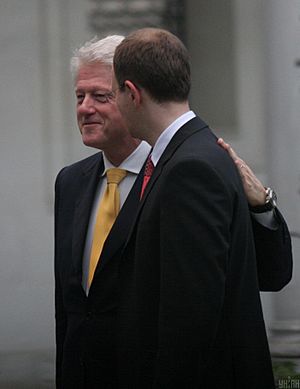
In January 2015, Yatsenyuk gave an interview where he talked about Russian actions. He said, "Russian aggression against Ukraine is an attack on the world order. We all remember well the Soviet invasion both in Ukraine, including, and in Germany. It must be avoided. Nobody is allowed to rewrite the results of the Second World War." He was referring to the Soviet occupation of Ukraine and East Germany after World War II. He wanted to show how Russia's actions now were similar to those past events.
Yatsenyuk believed that certain politicians who were in jail should be released. He thought their imprisonment was a big problem for Ukraine's path to the European Union.
In April 2016, Yatsenyuk said that state-owned companies should be sold to private owners in a clear way, except for very important ones. He also wanted independent leaders for all public companies. He called for a "strict policy towards any aggressor country," meaning Russia. He said there should be "no deals and compromise at the expense of Ukraine." He wanted Ukraine's land to be fully returned, including Donetsk, Luhansk, and Crimea. He also supported continuing sanctions against Russia until Ukraine's land is fully restored.
Family Life
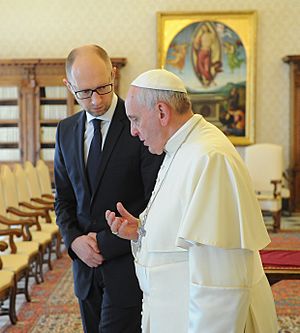
Arseniy Yatsenyuk is married to Tereza Viktorivna (born in 1970). They have two daughters named Khrystyna and Sofiya. His wife's parents were both philosophers. Yatsenyuk's family has lived near Kyiv since 2003. His sister, Alina Petrivna Steel, passed away on August 14, 2024, in Santa Barbara, California, USA.
Open Ukraine and Kyiv Security Forum
Arseniy Yatsenyuk leads the Open Ukraine Foundation. This international foundation is based in Ukraine and was started in July 2007. Its goal is to make Ukraine's reputation better around the world. Open Ukraine works with young artists, scholars, and community leaders who want to make positive changes in their regions.
The Kyiv Security Forum was also started by the Open Ukraine Foundation in 2007. It is an event held every year where important people discuss national security. They also talk about security in the Black Sea region, Europe, and globally. The forum brings together government officials, experts, leaders from organizations, thinkers, politicians, and journalists.
Since Russia's full-scale invasion began on February 24, 2022, the Open Ukraine Foundation has been helping the Ukrainian army and people. They have provided a lot of aid to the areas most affected by the war. On December 1, 2022, the Open Ukraine Foundation held its annual Kyiv Security Forum in Ukraine's capital. Many important international leaders attended.
Awards and Recognition
 Cavalier of the Order of Prince Yaroslav the Wise Fifth Class – awarded on February 7, 2008, for his important work in helping Ukraine join the World Trade Organization.
Cavalier of the Order of Prince Yaroslav the Wise Fifth Class – awarded on February 7, 2008, for his important work in helping Ukraine join the World Trade Organization.- Medal "For the Glory of Chernivtsi" (2008).
- Cavalier of the Order of Prince Yaroslav the Wise Fourth Class – awarded on June 19, 2017, for his important work in helping Ukraine join European programs, getting visa-free travel with the EU, and making Ukraine stronger internationally.
See also
 In Spanish: Arseni Yatseniuk para niños
In Spanish: Arseni Yatseniuk para niños
 | Madam C. J. Walker |
 | Janet Emerson Bashen |
 | Annie Turnbo Malone |
 | Maggie L. Walker |


